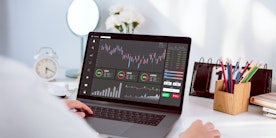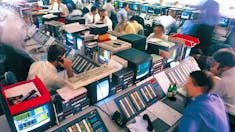eToro Order vs Trade – What's the Difference?
All products and services featured are independently selected by WikiJob. When you register or purchase through links on this page, we may earn a commission.
61% of retail investor accounts lose money when trading CFDs with eToro. You should consider whether you understand how CFDs work, and whether you can afford to take the high risk of losing your money.
Making trades online with eToro is simple and straightforward – if you know what type of trade or order you want to make.
There are various ways to make the most of the commission-free stock trading options available on eToro, but knowing the difference between trades and orders will determine which you will choose to build your portfolio.
In this article, we will look at what eToro is and how you can use it to buy and sell stocks, cryptocurrencies, and other trading instruments, and what the difference is between a trade and an order so that you can make an educated decision about the way you want to invest.
What Is eToro?
eToro was launched back in 2007 as a visual forex trading platform by Ronen and Yoni Assia with David Ring.
Originally based in Tel Aviv, it soon added different features – including a brilliant social trading addition.
For beginners (and even experienced traders), the opportunity to copy the buying and selling strategies of successful professional traders has become one of the most popular features of eToro.
This feature was first added in 2010 when it only dealt with forex, but it wasn’t long before eToro added more trading instruments.
In 2013, expansion began in a big way. Not only did it add options for trading stocks and commodities, eToro also were among the first online trading companies to offer customers a platform to trade digital currencies, starting with Bitcoin.
At this time, eToro also expanded its customer base, seeking regulation to cover them in the US, European, and Australian markets.
Today, eToro offer a robust selection of cryptocurrencies, stocks, ETFs, and commodities, which can all be traded using the web trader application or its mobile app – both designed to be user friendly with intuitive interfaces and support for new traders that includes excellent research tools and education.
61% of retail investor accounts lose money when trading CFDs with eToro. You should consider whether you understand how CFDs work, and whether you can afford to take the high risk of losing your money.
eToro Order vs Trade: The Definition
What Is eToro Trade?
A trade is the term used to describe the action of buying and selling securities using a trading platform (like eToro).
Traders make trades, either buying or selling these securities with the aim of making a profit.
All the buying and selling actions on eToro are known as trades.
What Is eToro Order?
The action that is taken to make a purchase or a sale on the trading platform can be done using an order.
Traders will make an order to complete their trade, and there are different types of orders that can be made based on how and when a trade should happen. Orders can have different parameters or a combination of different parameters to control the trade and (hopefully) improve the chances of making a profit.
Some different order types that might be used include:
-
Market Order: Place a buy or sell order with no restrictions, usually happening immediately during normal trading hours.
-
Limit Order: Order is placed when the trading instrument reaches a specific price only.
-
Stop Order: Order placed when the trading instrument reaches a specific price; can be modified (buy stop, sell stop, stop limit, trailing stop-loss).
Orders can be modified with other conditions, such as a day order that needs to be completed by the end of the trading day, or GTC (Good ‘til Cancelled) which is self-explanatory.
There are two order types of eToro options available for traders.
Market Order
The market order is essentially what most people mean when they talk about executing a trade on the platform.
The market order happens straight away (depending on liquidity) and the price used is the best price at the time.
With this order type, you have a greater likelihood of the trade happening (more about this later).
You can place a market order outside of normal eToro market trading hours; this will be executed as soon as the market next opens.
This point doesn’t matter if you are trading cryptocurrency as the market does not close.
Market orders work best with trading instruments that have good liquidity, are not particularly volatile, and when you are not making large orders
This is because despite being the type of order that is most likely to be executed, prices can fluctuate quickly on volatile securities, which can make them less profitable.
Furthermore, if you are making a big purchase (or a big sale), it can take a while to process and even influence the direction of the market.
Limit Order
A limit order will ensure that the trade will only be made when the instrument reaches a certain price.
For a sell order, you will select a minimum price limit for this, and for a buy order, you will set a maximum price.
This limit will reflect the price that you want to achieve, and it can be used to limit your risk.
In addition, you won’t move on the order until your parameters are met.
This type of trade gives you more control over the price and is most useful when used for a trading instrument that has low liquidity or is thinly traded, or one that has a high level of volatility with multiple price changes over a short period of time.
However, it is worth considering that there is a chance that the order might not be placed.
As the trade will not be triggered until your ideal price is reached, you might miss out on the opportunity to buy or sell completely, especially as the limit order will have an expiration date.
61% of retail investor accounts lose money when trading CFDs with eToro. You should consider whether you understand how CFDs work, and whether you can afford to take the high risk of losing your money.

eToro Trade vs Order: The Cost
The cost of trading is often more than the cost of the actual trade you are making; the platform needs to make money from its customers, and there are various ways that eToro does this, despite being one of the cheapest online trading platforms available.
Below are some of the costs that you need to consider outside of the purchase price of the trading instruments you are working with.
- No account opening fee
- No account management fees
- Commission-free trading on stocks and ETFs
- No fees for copy trading
- $5 fee for each withdrawal
- $10 per month inactivity fee after 12 months with no use
- USD base currency, so currency conversion fees might apply
- Market Spread: Each transaction has a small percentage added to it, which is based on the valuation of the position that you are taking and is set by the market, not by eToro.
The actual cost of the order that you make will depend on the type of order it is.
Essentially, if you are looking to limit costs or increase profits, then a limit order is a better choice than a market order or trade.
This is because you can select the price you are willing to pay (or receive) rather than just going with whatever the market value is.
Order vs Trade eToro: How to Choose
Choosing the way you want to trade is a personal decision.
Due to this, you should consider many different factors such as your own knowledge and how involved you want to be in the process.
Below are some things to think about.
However, please note, this should not be considered financial advice.
Trades (Market Orders)
The main things to remember about trades (market orders) are:
- They are usually executed immediately.
- The price used for the trade will depend on the market price when you trigger the trade.
- Market orders can be set out-of-hours and they will be completed as soon as the market opens.
- The trade is more likely to be completed.
- Trading using market orders can often be more expensive, and you have less control over the price you buy or sell at.
- This is most suited for trading instruments that have good liquidity and are not particularly volatile.
- Making large transactions using market orders can take a long time to complete, and it can influence the direction of the market as a whole.
Orders (Limit Orders)
When considering making a market order, consider the following:
- You can choose the price limit you want to use for the order.
- Limit orders can be used to set the minimum price that you want to sell at or the maximum price that you want to buy at.
- Limit orders may not be completed if the price doesn’t reach the limit that you have selected.
- A limit order will be triggered as soon as the price is reached, even if the market continues to move up or down afterwards, which could result in buying or selling too early and losing out on a better deal.
- These trades are useful in volatile markets, or for instruments that are thinly traded.
- Limit orders often work out to be more cost-effective if they work.
What to Think About When You Are Choosing Your Order Type
The way you approach trading will depend on several factors, and they will differ depending on who you are, what you know, and what you want to get out of the experience.
Before you decide on what your investment will look like, consider the following:
-
Do you have enough knowledge? – eToro has lots of helpful educational resources as well as an in-depth FAQ section, so you might want to get some learning in before you make an order or a trade.
-
How active do you want to be? – Limit orders can allow you to be more hands-off in your trading as you do not need to wait for the right time to make the trade, whereas if you are going for the market order trade then you may need to watch the market for a while to go in at the best price. For the ultimate in hands-off trading, automatic copy trading follows the actions of seasoned traders without you having to do anything.
-
Risk Appetite – There is risk in all forms of trading, and you need to decide whether you want to risk not getting the best price, or risk missing out on a trade entirely because it didn’t reach your limit before it expired.
-
Does Cost Matter? – If you just want in on a particular stock or to get a particular cryptocurrency, the cost might not be as important to you as the speed of execution is. On the other hand, you might want to limit costs (or maximise profits) using a limit order.
-
Type of Instrument – Is it something that is volatile in terms of price movement? Does it have good liquidity or is it something that is only thinly traded? This is likely to have an impact on what you choose.
Frequently Asked Questions
eToro is a well-regulated online trading platform and was founded in Tel Aviv in 2007 by brothers Yoni and Ronen Assia and David Ring. eToro is owned by the founders of eToro Group Ltd.
You can withdraw your funds from eToro at any time, and there is a $5 fee for each withdrawal made. To withdraw, you need to select the option from the left-hand menu in your account, and you’ll need to confirm the amount, the preferred currency, and the payment method that you want to use.
If you want to sell stocks on eToro, you need to select the stock from your portfolio and set up a SELL order. You can choose whether this is a market order, where the transaction will happen almost immediately and you will get the available market price, or a limit order where you can decide when you want to sell based on the price given.
If you want to withdraw funds from eToro, you will need to pay a withdrawal fee of $5. This charge is per transaction, so if you want to make the most of it, make sure you take out bigger amounts less often.
On eToro, an order is an instruction to the trading platform to either open or close a position on the market for you. You can have a buy order, where you are purchasing stocks, EFTs, cryptocurrencies and more, or a sell order where you are selling the securities that you already hold. You can place limit orders or market orders using eToro.
An eToro trade is the action of buying or selling a trading instrument using the eToro platform. A trade can be made using different order types, but most often used to refer to market orders, which are executed almost immediately at the current market price.
eToro offers automated copy trading, which means that you can set up your profile to follow the trading actions of the professional and successful traders that are part of the social trading network. This function has no cost, and you can just set it up and leave it to make the orders as others are doing.
Final Thoughts
The eToro platform is set up for market orders (trades) and limit orders and understanding the differences between these is an important part of deciding which is best for you.
Choosing the right way to start (or finish) a trade can have an impact on the cost of trading, but also on your profits so it makes sense to learn as much as you can.
eToro is a multi-asset investment platform. The value of your investments may go up or down. Your capital is at risk.
61% of retail investor accounts lose money when trading CFDs with eToro. You should consider whether you understand how CFDs work, and whether you can afford to take the high risk of losing your money.
This communication is intended for information and educational purposes only and should not be considered investment advice or investment recommendation. Past performance is not an indication of future results.
Copy Trading does not amount to investment advice. The value of your investments may go up or down. Your capital is at risk.
Don’t invest unless you’re prepared to lose all the money you invest. This is a high-risk investment and you should not expect to be protected if something goes wrong. Take two mins to learn more.
eToro USA LLC does not offer CFDs and makes no representation and assumes no liability as to the accuracy or completeness of the content of this publication, which has been prepared by our partner utilizing publicly available non-entity specific information about eToro.
WikiJob does not provide tax, investment or financial services and advice. The information is being presented without consideration of the investment objectives, risk tolerance or financial circumstances of any specific investor and might not be suitable for all investors. Past performance is not indicative of future results. Investing involves risk including the possible loss of principal.
61% of retail investor accounts lose money when trading CFDs with eToro. You should consider whether you understand how CFDs work, and whether you can afford to take the high risk of losing your money.






